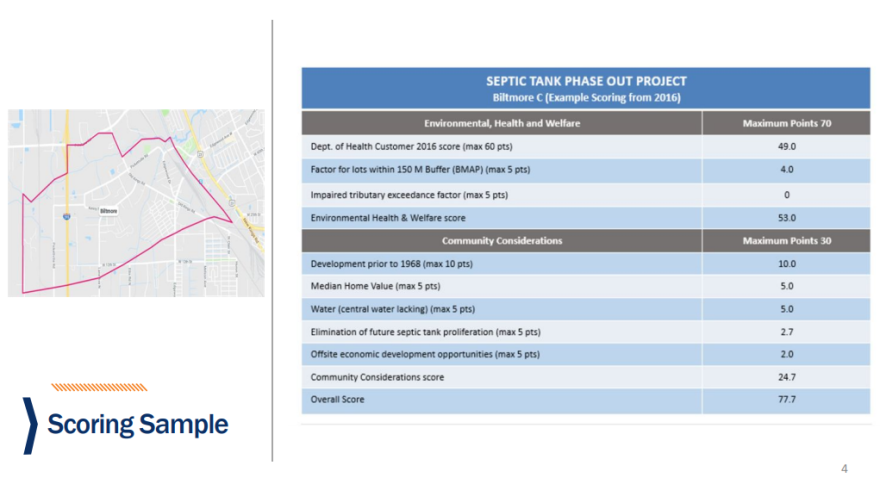Burdened by the hefty price tag of Jacksonville’s ongoing septic tank phase out program, JEA will next month begin looking to new technologies for an alternative to traditional gravity fed sewage systems.
“Septic tank phase out is incredibly important for our community,” JEA President and Chief Operating Officer Melissa Dykes told the public utility’s board during their meeting Tuesday.
She and Jacksonville’s Chief Administrative Officer, Sam Mousa, are co-chairing the current septic tank phase out program’s steering committee.
The original phase out program was established in 2016 with $30 million in seed money. Of that, $15 million is coming from JEA and the remaining $15 million is coming from the city. A recently approved contribution agreement between JEA and the city includes an additional $15 million commitment to the project from the utility company.
“By expanding infrastructure access, particularly in high impact neighborhoods, we are improving the health of the St. Johns River, we’re improving public health and we’re creating economic opportunity through property value improvements and through economic development,” she said.
According to Dykes, several factors are taken into consideration when calculating a neighborhood’s impact:
- Rankings issued by the health department
- Proximity to water bodies
- Impaired tributaries (meaning fecal matter has already been detected in a water body)
- Environmental health and welfare
- Developments built prior to 1968 are weighted higher than new developments
- Median home values
- Current level of infrastructure or lack thereof
- Concentration of vacant lots
- Economic opportunity
- Community considerations

In order to qualify for the septic tank phase out program, it’s not enough for a neighborhood to have a high impact score. At least 70 percent of residents have to agree to participate and sign an easement agreement. So far three projects have been identified and funded in Biltmore, Beverly Hills and Christobel.
“Our community outreach team has gone to each of the property owners in the first two neighborhoods to get easement agreements signed that allow us to then go in and put in the infrastructure that’s needed to make the connections and to remediate old septic tanks that are there on site,” Dykes said. “For Biltmore C, which is our first neighborhood, we not only met the 70 percent goal, we actually exceeded it and got 80 percent of those customers to sign up for this.”
In Beverly Hills, 79 percent of customers agreed to participate. Outreach to Christobel is expected to begin later this year.
But according to Dykes, funding is a massive obstacle for the project.

“Within JEA’s rate structure, and within every water and wastewater utilities’ rate structure, our rates are designed for operation and maintenance of existing infrastructure,” she explained. “So built within our monthly bill that you pay for water and wastewater, there isn’t money that’s built in there for new connections.”
That means when a customer initially connects to the city’s sewage system, they’re expected to shoulder all the costs associated with connection.
The city’s septic tank phase out program is set up to to cover those costs for each of the participating neighborhoods. “And just for context, to connect to water and wastewater infrastructure, including laying the infrastructure in the ground, costs between $35,000 and $40,000 for each connection,” explained Dykes. “It is a substantial cost and that’s fully funded by this program.”
Dykes told the JEA board Tuesday that once the program is complete, they will have phased out 1,600 septic tanks in Duval County. There are currently about 65,000.
Board chair Alan Howard acknowledged that many people in the community see this project as an unfulfilled promise of consolidation.
“It is a problem for our community,” he said. “I am proud of JEA for taking a leadership role in addressing this problem, and yet for all the work that’s been done… 1,600 is a proverbial drop in the bucket.”
At $35,000 to $40,000 a pop, those 1,600 phase outs could cost between $56 million and $64 million. JEA estimates it would cost about $2.5 billion to phase out all 65,000 of the county’s septic tanks.
“Is this the right and best way for us to approach this infrastructure problem, given all the advances in technology we’ve had in this area?” Dykes asked the board. “Is there a better way to do it? Can we reduce the cost of this need from $2.5 billion, where it sits today, to something far less?”
“Next month we are going to be issuing an RFP [request for proposal] for a consultant to assist us with studying this question - looking at all of the innovation that exists today, looking at all the technology that exists today, and figuring out whether we can figure out a better way to get infrastructure into these neighborhoods rather than the traditional gravity fed sewer technology, which has been around for decades,” she announced. “It doesn’t suggest that we’ll have a funding source identified at the end of asking this question, but it does suggest that asking the question is incredibly important to figuring out the right solution for our community.”
According to Howard, the board has approved a portion of the sale proceeds from the Southside generating station to be used to fund this study of new infrastructure solutions.
“I have high hopes that there is a better technology out there to address this on a neighborhood by neighborhood basis and that will lower the capital cost,” he said.
Brendan Rivers can be reached at brivers@wjct.org, 904-358-6396 or on Twitter at @BrendanRivers.









